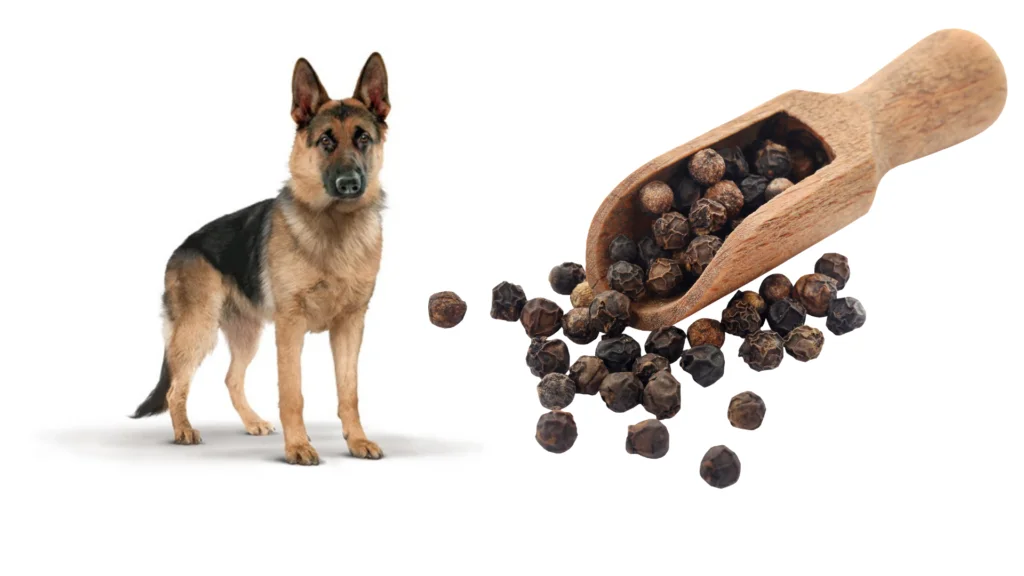Can Dog Eat Black Pepper? What happens if he eats food that contains spices, especially black pepper? Is it safe for their health?
Table of Contents
Many pet keepers share a lot of love, care, and kindness in caring for their dogs.
What types of foods do most people find is beneficial for their dog and what are not?
You may have often wondered if black pepper is safe for them.
Sometimes, we enjoy having spicy food in our meals. We like many spices and condiments to add to our diet. Some of us love to share meals with our pets.

We usually add black pepper. So, is it important to address the issue of whether black pepper is safe for dogs?
Feeding our pets is like feeding our children, it is very important to take a lot of care while feeding them.
Before feeding our dogs, many questions touch our minds as to whether my dog can eat this or that.
Also Read: German shepherd Puppy feeding Chart: 1 Month to 12 Months
What happens if he eats food that contains spices, especially black pepper? Is it safe for their health?
To give an idea of what black pepper is and whether it is safe for dogs, let’s discuss this issue in detail.
What is black pepper?
Black pepper is the dried blackberries of pepper, which are used as a whole spice or ground to make a spice powder.
Black pepper stimulates digestion, helps with weight loss, relieves coughs and colds, treats depression, improves skin, boosts metabolism, and prevents cancer.
Therefore, it is a great choice when you want to spice up your food.

Considering the benefits mentioned above, the question is whether black pepper is safe for dogs.
Also Read:
The answer to this question is very simple and straightforward: yes but, in very small amounts.
If you are thinking of feeding your dog with a diet that has black pepper as the main spice, the answer is no: because large amounts of black pepper are dangerous to small peers.
Can Dog Eat Black Pepper? Is black pepper safe for dogs?
For the question, Can Dog Eat Black Pepper? Black pepper, when used in small amounts as a seasoning in pet food or treats, is generally considered safe for dogs. However, it’s important to be cautious about the quantity and form in which it is given to your furry friend.
Here are some key points to consider regarding black pepper and its safety for dogs:
- Small Amounts are Generally Safe: A small pinch of ground black pepper is unlikely to harm your dog. Some commercial dog foods even include black pepper as a seasoning.
- Avoid Excessive Use: Excessive consumption of black pepper can lead to gastrointestinal upset in dogs. This may include symptoms like vomiting, diarrhea, or stomach discomfort. If your dog ingests a large amount of black pepper, it’s a good idea to consult your veterinarian.
- Whole Peppercorns are Risky: Whole peppercorns are a choking hazard for dogs, and if ingested, they can cause irritation or blockages in the digestive tract. Always ensure that any black pepper you use is finely ground and well-distributed if added to your dog’s food.
- Watch for Allergies or Sensitivities: Some dogs may have allergies or sensitivities to spices, including black pepper. If you notice any unusual behavior or symptoms after introducing black pepper to your dog’s diet, discontinue use and consult a veterinarian.
- Other Spices and Ingredients: Be cautious of other spices that might be mixed with black pepper in certain dishes or seasonings, as some, like garlic or onions, can be toxic to dogs.
- Consult Your Veterinarian: It’s always a good practice to consult your veterinarian before introducing any new ingredients or spices into your dog’s diet, especially if your dog has a history of allergies or sensitivities.
Black pepper in moderation is generally safe for dogs when it’s used as a seasoning in their food or treats. However, it’s crucial to be mindful of the quantity, form, and any potential allergies or sensitivities your dog may have. Always prioritize your pet’s well-being and consult with a veterinarian if you have concerns about their diet or any adverse reactions.
What Happens If Dogs Eat Black Pepper?
Black Pepper is another spice that is moderate. Although small amounts of black pepper are generally considered safe for dogs, large amounts of black pepper can cause stomach pain in dogs.
Can Dog Eat Black Pepper? yes, when dogs eat black pepper, it can lead to various effects, but in most cases, it is not toxic. However, there are potential dangers and risks associated with black pepper ingestion in dogs. Here’s a clear and concise explanation of the impact of black pepper consumption on dogs:
- Gastrointestinal Upset: The most common effect of dogs eating black pepper is gastrointestinal upset. This may include symptoms like vomiting, diarrhea, or stomach discomfort. These symptoms are generally mild and self-limiting, but they can cause temporary discomfort for your dog.
- Risk of Choking: Whole peppercorns, if ingested, can pose a choking hazard to dogs. Dogs may attempt to swallow them without properly chewing, leading to potential blockages in the digestive tract. It’s essential to ensure that any black pepper given to dogs is finely ground to avoid this risk.
- Allergic Reactions: While uncommon, some dogs may have allergies or sensitivities to spices, including black pepper. Allergic reactions can manifest as itching, skin rashes, or gastrointestinal issues. If you suspect an allergic reaction, discontinue the use of black pepper and consult your veterinarian.
- Toxicity Risk: Black pepper itself is not considered toxic to dogs in small amounts. However, certain other spices or ingredients commonly mixed with black pepper, such as garlic or onions, can be toxic to dogs. If a seasoning or dish contains these harmful ingredients along with black pepper, it can be more problematic for your pet.
Additionally, these are the observations that I have personally seen in my German shepherd
Burning sensation in the abdomen:
Consumption of large amounts of black pepper can cause many health risks. The base of the black pepper is hot.
Consuming a very small amount of black pepper in our diet is a really good choice. If we add large amounts of black pepper in our diet and even feed our dogs, it can cause great inflammation in the stomach.

This burning sensation can sometimes lead to irritation in the intestinal tract. Dogs can’t talk what they feel. But, common sense says that excessive consumption of black pepper causes such a problem in our stomach, then how does our dog feel?
This is a good choice to avoid the overuse of black pepper.
Hemorrhoids
Hemorrhoids Inflammation of the veins in the lower part of the anus and rectum.
Excessive intake of pepper can cause irritation of the rectum or colon mucosa, leading to hemorrhoids. A similar situation is seen in dogs.
Since dogs need a lot of care and kindness, it is important to limit the use of black pepper when cooking food.
Respiratory problems
Black pepper is also harmful when thawed. Many of us sprinkle ground pepper on edible items that the dog likes to eat.
Excessive inhalation of black pepper odor can lead to serious respiratory problems. This inhalation leads to oxygen deficiency and consequently hypoxia.

It is important not to use large amounts of pepper as this respiratory track problem can eventually lead to minor fellow death.
Causes diarrhea
When black pepper is taken in large quantities, it can lead to diarrhea in humans and dogs. Black pepper causes irritation in the digestive system and eventually leads to diarrhea. Hence;
Consuming large amounts of black pepper is harmful because it can lead to serious health problems. So, it is a good choice to stay on the safe side.
Causes bronchitis
Bronchitis occurs when the airways become infected and inflamed. The trachea is the way that air passes through your lungs and lungs.
Consumption of large amounts of black pepper can cause symptoms of bronchitis. So, before feeding black dogs to your dogs, it is important to consider this horrible fact.
Are there any potential health advantages for dogs associated with the consumption of black pepper?
Black pepper is a commonly used spice in human cuisine, known for its flavor-enhancing properties and potential health benefits. However, when it comes to dogs, the question arises: can black pepper offer any health benefits for them? In this essay, we will explore the potential advantages and disadvantages of incorporating black pepper into a dog’s diet, drawing from existing knowledge and scientific research.
Black pepper, when used in moderation and under appropriate circumstances, can offer some health benefits for dogs. However, it’s essential to be cautious about the quantity and form in which it is administered.
Health Benefits:
- Digestive Aid: Black pepper contains a compound called piperine, which may help improve digestion in dogs. Piperine stimulates the release of enzymes that aid in the digestion process. For dogs with mild digestive issues, a small amount of black pepper may offer relief.
- Anti-Inflammatory Properties: Piperine also has anti-inflammatory properties. Inflammation can be a common issue in dogs, leading to conditions like arthritis. Black pepper may help alleviate inflammation and provide some relief for dogs with these conditions when used as part of a balanced diet.
- Antioxidant Effects: Black pepper is rich in antioxidants, which can help combat harmful free radicals in a dog’s body. Antioxidants are essential for overall health and may contribute to a dog’s longevity.
- Enhancing Flavor: Black pepper can enhance the flavor of dog food, making it more appealing to picky eaters. This can encourage dogs to consume their meals, ensuring they receive the necessary nutrients.
Potential Risks and Counterarguments:
- Digestive Upset: Excessive consumption of black pepper can lead to gastrointestinal upset in dogs, causing symptoms like vomiting or diarrhea. It’s crucial to use black pepper sparingly to avoid these issues.
- Allergies or Sensitivities: Some dogs may have allergies or sensitivities to spices, including black pepper. It’s essential to monitor your dog for any adverse reactions and discontinue use if needed.
Can Dogs Have Salt And Pepper?
Dogs can consume small amounts of salt, but it should be provided in moderation, and pepper should be used sparingly. Here’s a breakdown of both:
Salt:
- Salt is essential for dogs, as it helps maintain proper bodily functions.
- Dogs require sodium for nerve function, muscle contractions, and maintaining a healthy balance of bodily fluids.
- However, excessive salt intake can lead to health issues, such as high blood pressure, kidney problems, and dehydration.
- Commercial dog foods typically contain the appropriate amount of sodium, so additional salt is often unnecessary.
- If you do add salt to your dog’s food, it should be a minimal amount (a pinch) and not a regular practice.
Pepper:
- Pepper, particularly black pepper, is generally safe for dogs when used in small amounts.
- It may offer minor health benefits, such as aiding digestion due to the presence of piperine.
- Excessive pepper can cause gastrointestinal upset in dogs, leading to vomiting or diarrhea.
- Whole peppercorns should be avoided, as they can pose a choking hazard.
- Pepper should be finely ground and lightly sprinkled on food if used, and it’s not a necessary component of a dog’s diet.
While dogs can have a small amount of salt and pepper occasionally, it’s crucial to exercise caution and use them sparingly. Excessive salt can lead to health problems, and too much pepper can cause digestive issues. It’s generally advisable to consult with a veterinarian before making any significant dietary changes for your dog and to prioritize their overall health and well-being.
Are there any spices, can my dog eat?
Yes, there are some spices that are safe for your dog: basil, ginger, parsley, turmeric, and cinnamon are safe.
Spices containing capsaicin content should be avoided for vomiting, diarrhea, gastrointestinal irritation, etc.
Intake of capsaicin-containing chilies, chilies, bell peppers, etc. can cause serious intestinal problems. Avoid consuming large quantities of such spices.
Here’s a simple chart outlining some common spices and their suitability for dogs:
| Spice | Can Dogs Eat? | Notes/Considerations |
|---|---|---|
| Basil | Yes | Small amounts are safe; fresh is better. |
| Cinnamon | In Moderation | Small amounts occasionally; avoid large quantities or cinnamon powder. Can help regulate blood sugar in diabetic dogs. |
| Oregano | Yes | Limited amounts are safe. Fresh is preferred over dried. |
| Parsley | Yes | Generally safe; can freshen breath. |
| Rosemary | In Moderation | Small amounts occasionally; may have antioxidant properties. |
| Sage | No | Can be toxic in large amounts. Avoid it. |
| Thyme | Yes | Small amounts are safe; fresh is better. |
| Turmeric | Yes | Avoid it entirely; can cause digestive distress and discomfort. |
| Nutmeg | No | Toxic and can lead to seizures and other health issues. Avoid entirely. |
| Garlic | No | Contains compounds that can be toxic to dogs. Avoid it. |
| Onions | No | Toxic to dogs and can lead to severe health problems. Avoid them. |
| Paprika | In Moderation | Small amounts occasionally; avoid hot/spicy varieties. |
| Black Pepper | In Moderation | Small amounts occasionally; finely ground is better. Can aid digestion in small quantities. |
| Chili Pepper | No | Avoid entirely; can cause digestive distress and discomfort. |
| Salt | In Moderation | Small amounts occasionally; excessive salt can lead to health problems. |
Best alternatives To Black Pepper For Dogs
Here’s a chart listing some alternative seasonings to black pepper that can be used to add flavor to your dog’s food:
| Seasoning | Notes/Considerations |
|---|---|
| Turmeric | Turmeric contains curcumin, which has anti-inflammatory properties. Use in small amounts to add flavor and potential health benefits. Ensure it’s not mixed with other harmful ingredients like garlic or onions. |
| Parsley | Fresh parsley can be a safe and flavorful option for dogs. It may also help freshen their breath. Use it as a garnish or mix it into their food. |
| Basil | Fresh basil can add a pleasant aroma and taste to your dog’s food. Use it sparingly, and ensure it’s free from any harmful additives. |
| Thyme | Fresh thyme can provide a unique flavor. Use small amounts as a seasoning. Fresh herbs are preferable to dried ones. |
| Oregano | Fresh oregano can be sprinkled lightly on your dog’s food for added flavor. Ensure it’s free from any added salt or spices. |
| Rosemary | Use fresh rosemary sparingly as a seasoning. It can offer a mild flavor and potential antioxidant benefits. Remove the woody stems before use. |
| Cinnamon | Use ground cinnamon sparingly. It can add a touch of sweetness and potential health benefits like regulating blood sugar. Ensure it’s not mixed with harmful ingredients. |
| Sweet Potatoes | Cooked and mashed sweet potatoes can be added to your dog’s food for a natural and sweet flavor. They are nutritious and safe. |
| Carrots | Cooked or raw carrots can be a crunchy and tasty addition to your dog’s meals. They are low in calories and high in vitamins. |
| Pumpkin | Plain canned pumpkin (not pie filling) can be used to add flavor and fiber to your dog’s diet. It’s often enjoyed by dogs and is nutritious. |
| Apples | Sliced or chopped apples, minus the seeds and core, can be a refreshing and slightly sweet addition to your dog’s food. Remove seeds as they contain cyanide. |
Always introduce new seasonings gradually and in small amounts to your dog’s diet to ensure they don’t have any adverse reactions. It’s essential to use these seasonings sparingly and avoid any additives, preservatives, or harmful ingredients that might be present in commercial seasonings or spice blends. If you have any doubts or concerns about using specific seasonings for your dog, consult with a veterinarian for guidance tailored to your pet’s individual needs.
What to do if your dog eats black pepper
Black pepper does not provide any health benefits to dogs, and people do not like the taste of black pepper in dogs. For these reasons, it is best to skip this seasoning for dogs.
However, some dogs eat scraps found on the ground or in the trash.
If your dog eats large amounts of black pepper, watch him for a few hours to make sure he is not experiencing abdominal pain (vomiting and/or diarrhea).
Pumpkin powder for dog stomach upset
Pumpkin powder is often recommended as a natural remedy to help alleviate stomach upset in dogs, particularly issues like diarrhea or constipation. Here’s how it can be beneficial:
- High Fiber to the Rescue - dry pumpkin powder is natural...
- Yummy and as Easy to Serve as Canned Pumpkin - every picky...
- Bark&Spark Commitment - we are keen to give best to our...
- Best Value - with 8.1oz jar you will get up to 2 month...
- Fiber Content: Pumpkin is rich in dietary fiber, both soluble and insoluble. The soluble fiber in pumpkin can absorb excess water in the digestive tract, helping to firm up loose stools in cases of diarrhea. On the other hand, insoluble fiber can aid in moving things through the digestive system, which may help with constipation.
- Digestive Soothing: Pumpkin’s gentle nature makes it easy on a dog’s stomach. It can help soothe inflammation and irritation in the gastrointestinal tract.
- Nutrient-Rich: Pumpkin is packed with essential nutrients like vitamins A, C, and E, as well as potassium and antioxidants. These nutrients can support your dog’s overall health.
- Low in Calories: Pumpkin is relatively low in calories, making it suitable for dogs on a diet or those with weight management concerns.
To use pumpkin powder for a dog’s stomach upset:
- Start with a small amount, typically 1-2 tablespoons, mixed into their regular food.
- Ensure you’re using plain pumpkin powder with no added sugars or spices. Pure pumpkin is best.
- Monitor your dog’s response. If the stomach upset persists or worsens, consult your veterinarian.
Remember that while pumpkin powder can be a helpful home remedy for mild stomach issues, it should not be used as a substitute for professional veterinary care if the problem is severe or prolonged. If your dog’s stomach upset persists for more than a day or is accompanied by other concerning symptoms, consult your veterinarian for a proper diagnosis and treatment plan.
If your dog starts vomiting or has a lot of diarrhea after eating too much black pepper, consult your veterinarian for advice.
Black pepper substitutes
Do you want to spice up your dog’s meal? Here are some good substitutes you can use instead of black pepper:
Oregano. This herb is very tasty and very nutritious for dogs. It also helps ease the side effects of black pepper to help your dog’s digestive problems. You can also buy oregano drops specifically designed for pets.
Rosemary. Rosemary herb is rich in calcium, iron and vitamin B6. It is a powerful antioxidant and is safe for dogs if given in moderation.
Parsley. Parsley is a flavorful herb that can also help solve your dog’s bad breath. It is also rich in lycopene and carotene which can enhance your dog’s health.
FAQs
What spices can be harmful to dogs?
Some spices can be harmful to dogs. For example, garlic and onion contain compounds that can cause damage to a dog’s red blood cells, potentially leading to anemia. Nutmeg is toxic and can result in neurological issues, seizures, and digestive distress. Additionally, excessive salt can lead to sodium ion poisoning, causing symptoms like vomiting, diarrhea, and in severe cases, tremors or seizures. While many spices are safe in small amounts, it’s crucial to be cautious and avoid seasonings with these harmful ingredients when preparing food for your dog.
Does turmeric have any adverse effects on dogs?
Turmeric is generally considered safe for dogs when used in moderation. It contains curcumin, which has potential anti-inflammatory and antioxidant properties. Some dog owners use turmeric to help with joint pain and inflammation, particularly in senior dogs. However, excessive consumption can lead to digestive upset. It’s essential to consult with a veterinarian before adding any new supplement or spice to your dog’s diet to ensure it’s appropriate for their individual health needs.
Is garlic detrimental to dogs?
Garlic is considered detrimental to dogs and should be avoided. It contains compounds called thiosulfates, which can damage a dog’s red blood cells and lead to anemia. Even small amounts of garlic can be harmful over time, so it’s best to eliminate it entirely from your dog’s diet. If your dog ingests garlic accidentally or in a prepared dish, it’s advisable to contact a veterinarian for guidance.
Is onion suitable for canine consumption?
Onions are not suitable for canine consumption. They also contain thiosulfates, which can damage red blood cells, leading to anemia. Both raw and cooked onions are toxic to dogs, and even small amounts can be dangerous. If your dog ingests onions, seek immediate veterinary attention. It’s essential to be cautious when preparing meals for your dog to ensure that onions and onion-containing ingredients are kept out of their food.
Are tomatoes safe for dogs to eat?
Tomatoes are generally safe for dogs to eat in moderation. They contain nutrients like vitamins A and C. However, the green parts of the tomato plant (leaves, stems, and unripe tomatoes) contain a substance called solanine, which can be toxic to dogs in large amounts. Ripe, red tomatoes are typically safe when offered as a small treat, but excessive consumption can lead to digestive upset. Remove any green parts before sharing tomatoes with your dog.
Can dogs consume potatoes safely?
Potatoes can be a safe and nutritious addition to a dog’s diet when prepared properly. Plain, cooked potatoes (without added butter, salt, or seasonings) are a source of carbohydrates and fiber. They can provide energy and digestive benefits. However, avoid feeding dogs raw potatoes, as they contain solanine, which can be toxic. Also, be mindful of any added ingredients when serving potatoes to your dog, as certain seasonings or toppings can be harmful. Always introduce new foods gradually and monitor your dog for any adverse reactions.
Conclusion
Dogs are very loyal to their owners and their lives do not last as long as ours, so it is important to pay special attention to these little loyal friends.
Always remember that dogs can eat anything, so you need to keep in front of them, keeping a close eye on their meals.
Finally, Can Dog Eat Black Pepper? There is a big difference between consuming large amounts of black pepper and consuming large amounts.
Excessive amounts of black pepper can cause serious health problems for your dog. Hence, it is very important to be safe and secure from such an accident.
Remember that dogs cannot speak their minds, so it is important to look out for such small loyal companions at large.


